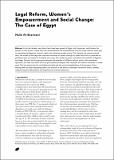| dc.contributor.author | Al-Sharmani, Mulki | en |
| dc.date.accessioned | 2016-01-11T16:28:52Z | |
| dc.date.available | 2016-01-11T16:28:52Z | |
| dc.date.issued | 01/03/2010 | en |
| dc.identifier.citation | Al-Sharmani, M. (2010) Legal Reform, Women's Empowerment and Social Change: The Case of Egypt. IDS Bulletin 41(2): 10-17 | en |
| dc.identifier.issn | 1759-5436 | en |
| dc.identifier.uri | https://opendocs.ids.ac.uk/opendocs/handle/20.500.12413/7815 | |
| dc.description.abstract | In the last decade, new family laws have been passed in Egypt, with important ramifications for women. In this article, I argue that two issues diminish the transformative role that these reforms could play in strengthening Egyptian women's rights and achieving gender justice. First, despite the recently passed laws, the model of marriage that the state continues to uphold through its codes and courts is premised on gendered roles and rights for husbands and wives. This model, however, contradicts the realities of Egyptian marriages. Second, the incongruence between the agendas of different reform actors, their piecemeal approach, and their top?down and non?participatory strategies have impacted the reform outcomes in mixed ways. This has meant that the multidimensionality and the social?embeddedness of the process of law?making have not been adequately taken into account in the efforts undertaken by reform actors, thereby undermining the effectiveness and significance of these endeavours. | en |
| dc.format.extent | 8 | en |
| dc.publisher | Blackwell Publishing Ltd | en |
| dc.relation.ispartofseries | IDS Bulletin Vol. 41 Nos. 2 | en |
| dc.rights.uri | http://www.ids.ac.uk/files/dmfile/IDSOpenDocsStandardTermsOfUse.pdf | en |
| dc.title | Legal Reform, Women's Empowerment and Social Change: The Case of Egypt | en |
| dc.type | Article | en |
| dc.rights.holder | © 2010 The Author. Journal compilation © Institute of Development Studies | en |
| dc.identifier.doi | 10.1111/j.1759-5436.2010.00118.x | en |

